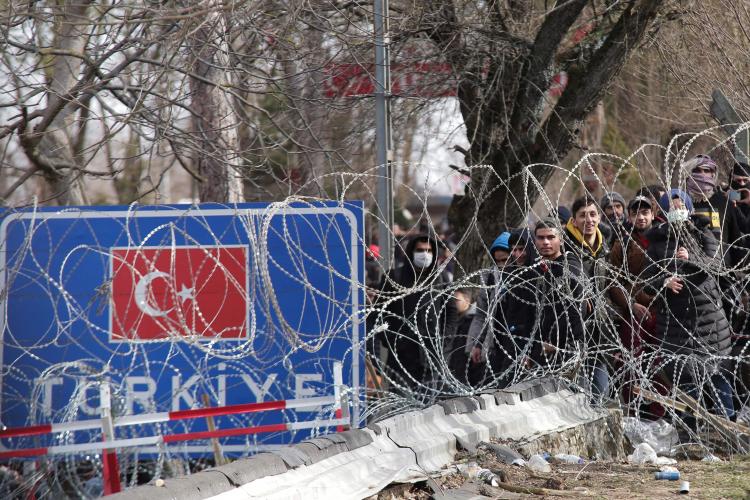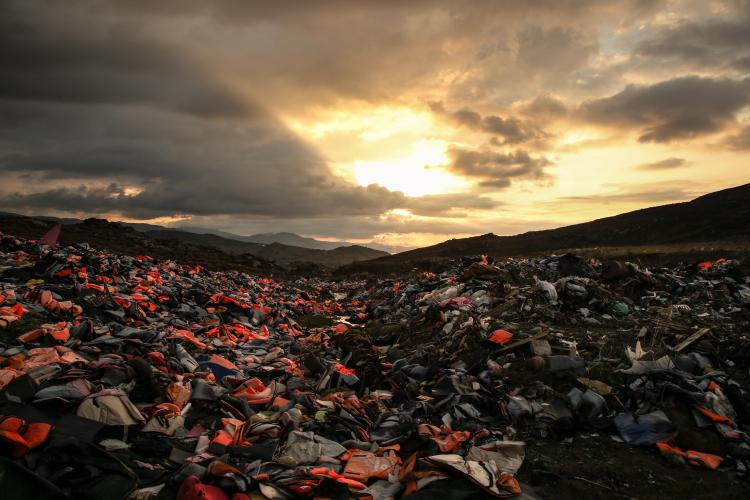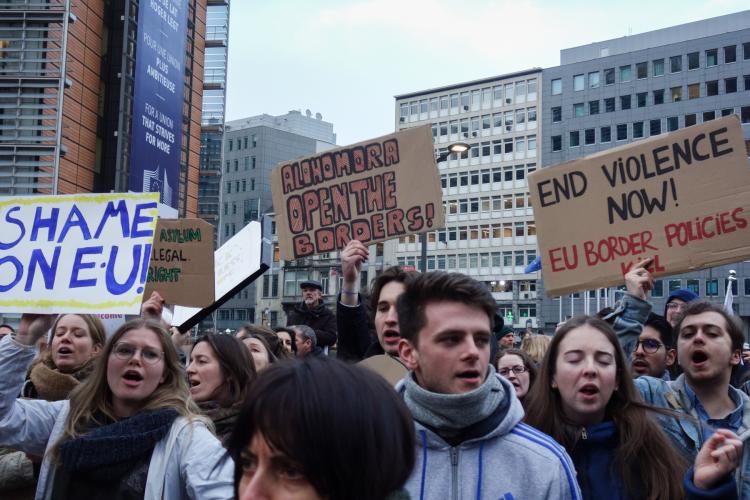On its 70th Anniversary, the Refugee Convention Faces Unprecedented Threats Across Europe
Posted:
Time to read:
Guest blog by Rosie Rooney and Marta Welander. Rosie is the EU and UN Advocacy Coordinator at Europe Must Act, a collective of grassroots campaigners calling for an alternative to camps and increased relocations. Marta is the Founder of the human rights organisation Refugee Rights Europe. In this blog, the authors warn that the integrity of the Refugee Convention is threatened, and emphasise the need for civil society action to safeguard it.

Seventy years ago, on 25 July 1951, representatives from 24 UN member states gathered in Geneva to adopt the Convention relating to the Status of Refugees. In the aftermath of World War II and the resulting displacement of millions of people across Europe, the treaty was conceived of as a response to the need for urgent action to protect people on the move, and a recognition that resolving the displacement crisis would not happen overnight. The Refugee Convention, as it came to be known, sent a clear message that governments should continue to welcome those seeking sanctuary through renewed and lasting international cooperation.
Yet today in Europe, the birthplace of the Convention, the right to claim asylum and the responsibility of Governments to uphold that right, faces unprecedented threats, leaving thousands of women, men and children on the move in legal limbo and extreme precarity in Europe’s internal and external borderlands.
All EU Member States and the United Kingdom are signatories to the 1951 Convention and 1967 Protocol, and EU policy relating to asylum must be consistent with both treaties. Yet UNHCR has repeatedly raised concerns that European nations are both failing to meet their international obligations on reception facilities for those individuals who do manage to make it to Europe to claim asylum, and are forcibly returning and preventing entry by many more.
At the EU level, debates and legislative proposals intended to deliver a rights-based common approach to the question of asylum have floundered and failed, as the EU and Member States revert increasingly to policies of containment and deterrence. If 1951 marked a moment at which governments proactively established international standards for refugee protection, 2021 is the era when, far too often, governments turn a blind eye or defy those standards entirely, endangering people on the move who become trapped in hotspots, border zones and informal settlements as their fundamental right to claim asylum goes unrecognised.
Pushbacks and expulsions
Despite unequivocal obligations under the Geneva Convention, EU Member States have for years unlawfully prevented displaced individuals from entering their territory and forcibly returned them to neighbouring or third countries, in violation of the right to seek asylum and the principle of non-refoulement. The EU institutions have consistently failed to hold Member States accountable for these ‘pushbacks’ and in fact actively enable them, offering financial, operational, and political support to third states who perpetrate human rights violations to stop individuals from reaching EU territory.
Notably, the EU and Italy have been training, funding and providing operational assistance to the so-called Libyan Coast Guard (LCG) since 2015. Since the EU began this cooperation, more than 40,000 people have been intercepted at sea and returned to Libya by the LCG, and more than 6,500 displaced individuals in 2020 alone. This cooperation was established and persists despite the well documented grave human rights violations taking place in Libya – including torture, slavery and suspected war crimes such as forced conscription.
In January 2021, responding to the increasing frequent occurrences of expulsions and pushbacks of refugees at Europe’s land and sea borders, UNHCR issued a statement condemning such practices as “simply illegal.” Yet despite blatantly contravening the principle of non-refoulement as laid down in the Convention, pushbacks continue unabated and are estimated to have stopped at least 40,000 people entering Europe since March 2020, as well as being linked to the death of more than 2,000 people in the same period.

Undermining and ignoring the right to claim asylum
The right to claim asylum as protected by the Convention faces threats from many quarters, as countries including Denmark, Hungary, the UK and Greece adopt laws and practices that make claiming asylum effectively impossible. In the context of the United Kingdom, juxtaposed border arrangements with France have prevented individuals arriving at its border from accessing the UK asylum system for several decades, unless they take matters into their own hands and cross the English Channel in the back of a lorry or on a small boat. Hard-line immigration rhetoric employed by successive UK governments means that today, the paradoxical concept of “illegal entry” to claim asylum has become a standard and broadly unchallenged line in government messaging. What makes this situation even more deplorable is that while on the one hand the UK Government circumvents the right to asylum on its own territory, it also continuously provides active political and financial support in implementing an extremely hostile and precarious environment for displaced people in northern France. This contributes to increased dysfunctions in the right to seek asylum in France too, where police brutality, harsh living conditions and enforced destitution mean that many people do not feel it is a country they can safely seek protection from. As a result, people become trapped in an untenable legal limbo on the border, afraid of claiming asylum in France and offered no safe route to do so in the UK.
These problems will only be compounded by the United Kingdom’s proposed Nationality and Borders Bill and related plans. Representing a fundamental challenge to the principle of refugee protection, UNHCR has stated that they would “undermine the 1951 Convention and international protection system, not just in the UK, but globally.”
In Greece, the decision by the government to entirely, albeit temporarily, suspend the right to claim asylum between March and May 2020 was met with condemnation by human rights observers and charities on the ground. Again, this decision expressly violated the right of individuals to claim asylum in Greece as enshrined in the Convention. Yet the response of the EU Commission and Member States was ambivalent at best – indeed the illegal actions of the Greek government were shortly followed by the EU announcing it would offer Greece an additional 700 million EURO to “upgrade its infrastructure at the border.”
Externalisation to third countries, abnegation of responsibility
The tendency of the EU to overlook or even congratulate border countries who ignore their international obligations perhaps helps explain the fact that Greece felt able to announce on 7 June 2021 that it henceforth considers Turkey a ‘safe third country’ for asylum seekers from Syria, Afghanistan, Pakistan, Bangladesh and Somalia, yet another decision which fails to take into account Geneva provisions.
As Vasilios Papadopoulos, the president of the Greek Council for Refugees (GCR) highlights, “the concept of a safe third country presupposes the provision of a level of protection in accordance with the Geneva Convention on Refugees by the third country, the existence of an essential link between the asylum seeker and that country and the consent of the third country. In the case of Turkey, none of the above is the case.” The decision has extremely worrying implications for both asylum seekers and those who have been granted protection in Greece, having already resulted in at least one anecdotal report from actors on the ground of an individual in receipt of protection having that status revoked when visiting the Greek Asylum Service to renew his ID card.
The role of the ‘guardian’ of the Convention
UNHCR, as the ‘guardian’ of the 1951 Convention and the 1967 Protocol, seeks to work with governments to ensure that they comply with their international obligations on the protection of refugees. Yet the agency also faces criticism from charities, lawyers and activists who have repeatedly raised concerns that UNHCR risks becoming complicit in the implementation of anti-migration EU policies, and argue that it must take a much stronger stance against blatant violations of the Convention.
Organisations on the ground in Greece have expressed dismay at UNHCR involvement in the construction of new camps and concrete walls that seek to further contain and isolate displaced people from the general population on the islands and mainland. Meanwhile UNHCR has so far indicated broad support for the Commission’s proposed Migration and Asylum Pact, when arguably a robust focus on constructive criticism is required to mitigate some of the most worrying aspects of the proposals, particularly those concerning the euphemistically-termed ‘voluntary’ returns and ‘simplified’ asylum procedures.
Standing up for the right to asylum - more important than ever before
The frequency and breadth of violations of the Convention and Member States’ persistent disregard for the rights enshrined within it should be a concern for us all, a reality that people in displacement and observers on the ground understand all too well. Charities and campaigners on Europe’s borders recognise their vital role in advocating for the right to asylum. In this space, Europe Must Act leads the Europe-wide No More Camps campaign calling for in-community alternatives to camps in Greece and increased relocation pledges from EU Member States. Refugee Rights Europe has for the past five years documented the rights violations among displaced people across Europe, calling for the provisions of the Refugee Convention and wider international law to be upheld. Likewise, the two long standing networks ECRE and PICUM are playing an invaluable role in this space, alongside INGOs at the European level, while groups like the Refugee Council, Refugee Action, JCWI and Detention Action relentlessly fight for the right to asylum and protection to be safeguarded in the UK.
Playing a crucial role in documenting violations and ensuring that the protections guaranteed by the Convention are upheld, the Border Violence Monitoring Network (BVMN), a self-organised collective of grassroots NGOs, produced a 1,500 page report in December 2020, documenting non-refoulement violations against over 12,000 people trying to enter Europe. Titled the ‘Black Book of Pushbacks’, the report includes hundreds eye-witness testimonies by people who have had their rights to claim asylum under the Convention and international law violated at the borders. By the same token, the End Pushbacks Partnership produced an extensive report documenting pushbacks and the failure to uphold the right to asylum across Europe’s internal and external borders in 2020. Similarly, groups like the Human Rights Observers (HRO) in northern France and Progetto 20K and Kesha Niya at the French-Italian border document rights violations on a daily basis, while refugee-led initiatives documenting rights violations are also emerging.

A continued demand for fair and humane asylum policies
In taking an active role to protect and defend the rights of individuals to claim asylum in Europe, individuals, organisations and collectives are continuing a history of civil society engagement in matters of asylum and protection that dates back to the Geneva Conference and beyond. Indeed, observers present for the development and adopting of the Refugee Convention in 1951 included trade unions, the World Jewish Congress, the International Union of Catholic Women’s Leagues, the Girl Guides and the World University Service. Though they could not have anticipated the world as it is today, the individuals who attended the Geneva Conference in 1951 understood that where and whilst persecution, conflict, violence and protracted crises exists, so too must binding and universal protections against these threats.
It is heartening to know that in 1951, civil society actors were calling on governments to demonstrate greater ambition, humanity and solidarity for those seeking sanctuary.70 years on, as campaigners and activists continue to demand fair and humane asylum policies in Europe, this tradition certainly persists. In the face of a hardening approach by the EU and Member States, the role of civil society in protecting the Refugee Convention and the rights of those seeking sanctuary remains as vital as ever.
Any comments about this post? Get in touch with us! Send us an email, or post a comment here or on Facebook. You can also tweet us.
__________
How to cite this blog post (Harvard style)
Rooney, R. and Welander, M. (2021). On its 70th Anniversary, the Refugee Convention Faces Unprecedented Threats Across Europe. Available at: https://www.law.ox.ac.uk/research-subject-groups/centre-criminology/centreborder-criminologies/blog/2021/07/its-70th [date]
Share:








